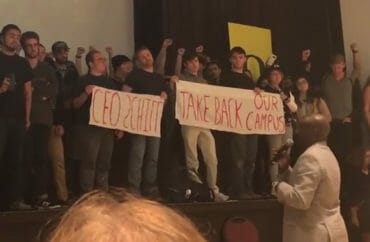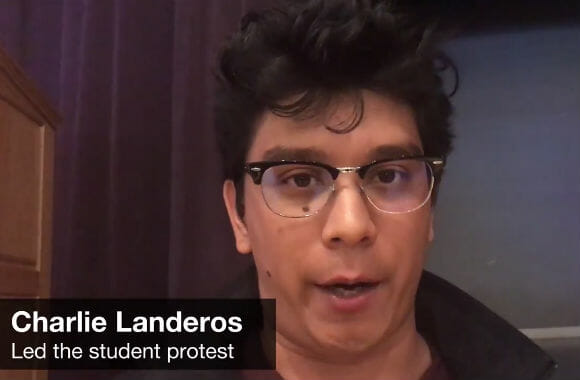
Sustained disruption is OK if the audience can sort of hear the speaker
What is the point of higher education if even faculty celebrate the sustained disruption of other people’s speech and advocate for a public university to violate its First Amendment obligations?
The University of Oregon Senate, the professor-led shared governance body at the taxpayer-funded institution, has unequivocally sided with the student activists who shut down President Michael Schill’s State of the University speech (to “stand against fascism“) before he could even ascend the podium.
After the university charged them for disruption and “failure to comply” with warnings to end their disruption, the activists spoke at a UO Senate meeting to ask for its intervention. Though some of their grievances were related to due process, mostly the activists wanted to evade responsibility for violating commonsense university policy.
Now the Senate has obliged by doing exactly the opposite of the University of Chicago’s pioneering 2015 statement on freedom of expression.
It approved a resolution Wednesday backing the activist UO Student Collective and its efforts to “create meaningful structural change,” and demanding the administration halt the disciplinary proceedings against several activists, the Daily Emerald reports.
The newspaper nonsensically describes the approved resolution as addressing “student conduct code inconsistencies regarding free speech and civil disobedience and peaceful protesting.”
If you read the collective’s original resolution to the Senate, it becomes clear the activists believe they have the right to shut down and disrupt other people’s speech, and that enforcement of the conduct code is actually “retaliation.” They believe the ends – fighting “hate crimes” and “White Supremacist speech” (never defined) – justify the means of shutting down a university official’s speech announcing a $50 million donation.
They are not being investigated for “protesting,” as they claim, but rather for exercising the heckler’s veto. (One student who provided hard evidence she was not at the shutdown was in fact exonerated.)
Though the collective’s resolution also demanded the university “deny White Supremacist and hate groups a platform on this campus” – which is flatly unconstitutional for a public university – the Senate broke off that portion into a separate resolution that will get a later vote.
MORE: Student protesters shut down president’s speech to ‘stand against fascism’
Students have the right to protest ‘even disruptively’
President Michael Schill and Provost Jayanth Banaver tried to dissuade the Senate in a letter before the vote, noting that UO’s federal and state constitutional obligations “are not negotiable” and that the “retaliation” claim is laughable:
There is a difference between peaceful protest and civil disobedience. No student would ever be punished for peaceful protest or appropriately drawing attention to issues or areas of concern. But students who disrupt the peaceful activities of others and interfere with their rights may be held accountable for violating the Student Conduct Code and university policy. Accountability is not retaliation. [emphasis in original] …
Whether you agree with these students or not, those who took the stage during the State of the University address and stayed despite being asked to leave made a conscious decision to violate university rules and policies. … It is presumable that some of them felt strongly enough about their message and cause that they were willing to accept the consequences of violating the rules.
The Daily says the collective’s resolution was amended shortly before the vote this week, and the approved version posted by UO Senate President-elect Bill Harbaugh has some differences from the only version posted on the collective’s Facebook page.
Unlike the Daily, Harbaugh describes several parts of the meeting, including the close margin of the vote, 23-21. He explicitly admits the students “disrupted” the State of the University event, and notes the collective made changes to the resolution in response to the letter from Schill and Banaver.
Yet the final resolution amounts to a whitewashing of the actual disruption of the State of the University address. Relevant parts:
2.1 BE IT THEREFORE RESOLVED that the UO Senate supports the rights of students to peacefully protest during university events, even disruptively, so long as those protests do not prevent speakers from being heard and the audience from hearing what they have to say …
2.2 BE IT FURTHER RESOLVED that the Senate recognizes that the students involved in the protest at the State of the University Address succeeded in bringing significant matters of academic concern and student well-being to the attention of the university community, and that we urge that this be taken into consideration when judging their discipline cases …
The only real question in these disciplinary cases is correctly identifying student protesters, and there’s plenty of evidence to consult.
The protesters indisputably prevented speakers “from being heard.” Their ringleader, the coward and faux constitutional scholar Charlie Landeros, used a frickin’ bullhorn.
MORE: Schill compares his students to the ‘fascists’ they protest
And the resolution celebrates students for explicitly violating university policy because it approves of their ends – “bringing significant matters of academic concern and student well-being to the attention of the university community.”
This resolution should have junked the apologia for disruption and stuck to the due-process criticisms of UO’s process: the absence of “student peers” in judging disciplinary cases on free speech, and the “public statements that may prejudice the adjudication” of the cases.
We look ‘partisan and reactionary’
Harbaugh, an economics professor who has rightfully criticized illiberal UO administration actions in the past, decided to join the dark side and embrace the illiberalism parade by congratulating the student activists on their odious achievement.
One commenter on Harbaugh’s post had the same impression I did, that “the senate supports the disruption of a regularly scheduled speech, denying the speaker the right to speak. … And we wonder why the general public shakes headsat [sic] us.”
A psychology professor who voted against the resolution, Elliot Berkman, commented that the resolution was futile because it was “merely a suggestion” and the faculty were closely divided in any case.
He denounced the Senate for embracing an “us-versus-them” mentality that looks both “partisan and reactionary” and also uninterested in the basic facts of the investigation:
What if, in fact, all rules and regulations were followed correctly and some kind of disciplinary action is appropriate under the policies as they stand? As several senators noted in discussion, we do not have enough information about the events to know. Taking any action in the absence of sufficient information only serves to discredit us.
Berkman said the Senate had “fooled ourselves and the students” into believing it had accomplished something substantial:
If there is a problem with the student conduct procedures, in this case or more broadly, then the senate should take a systematic, careful look and propose concrete solutions through legislation. In this resolution, what we have focused narrowly, futilely, and unproductively on this specific incident.
It’s really worth contrasting the emoji-shrug attitude of the UO Senate toward the heckler’s veto, with the relevant portion of the University of Chicago’s statement on freedom of expression:
Although members of the University community are free to criticize and contest the views expressed on campus, and to criticize and contest speakers who are invited to express their views on campus, they may not obstruct or otherwise interfere with the freedom of others to express views they reject or even loathe.
The point of the collective’s protest was to obstruct and interfere with Schill’s speech. It is not remotely protected by freedom of expression, unless you define it to include disruptions that don’t completely drown out the speaker.
After the student activists defended their disruption as an exercise of their free speech, the chancellor and law school dean at the University of California-Irvine publicly rebuked them, and I hope they do the same to the UO Senate:
It has long been recognized in constitutional law that the “heckler’s veto” — defined as the suppression of speech in order to appease disruptive, hostile, or threatening members of the audience — can be as much a threat to rights of free expression as government censorship.
Read the Daily article, Schill and Banaver’s letter and Harbaugh’s post. For a refresher on the perniciousness of the heckler’s veto, read the UC-Irvine leaders’ essay.
MORE: Cowardly heckler Charlie Landeros explains the Constitution
IMAGES: The Oregonian/YouTube
Like The College Fix on Facebook / Follow us on Twitter








Please join the conversation about our stories on Facebook, Twitter, Instagram, Reddit, MeWe, Rumble, Gab, Minds and Gettr.